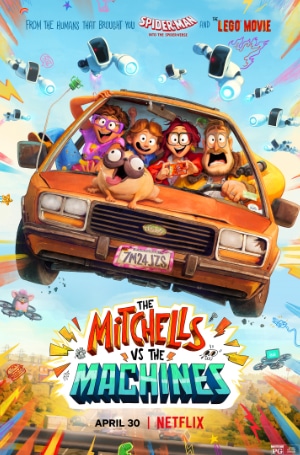From the creators of Spiderman: Into the Spiderverse comes a raucous animated comedy about one ordinary family facing a machine apocalypse. For the most part, I tolerate family animated movies. Too often they are filled with cliches and kid humor with less than creative plots offering minimal, if any, inspiration or substantial reflective material. I feel for parents who are subjected to watching these movies with their children. However, this one surprised me. Not only is it unique and engaging, but I also received a profound life lesson from watching it.
The Mitchells vs. the Machines is about a less-than-perfect family. Always one step away from total chaos, the Mitchells’ house is just slightly skewed with each member of the family flouting their own form of eccentricity. Katie (Abbi Jacobson) is a quirky teenager aspiring to be a filmmaker always feeling out of place and seeking “her people” or similar creatives who get her. She creates short movies and docu-series mainly about her life and her family while anxiously preparing to go off to the film school of her dreams. Her dad Rick (Danny McBride), the extreme outdoorsman completely inept at technology doesn’t understand Katie’s media aspirations, thinking technology a distraction from the important things of life. Linda (Maya Rudolph), a fiercely loving mom and third grade teacher, takes on the role of the peacemaker seeking to keep everyone happy and upbeat, even by baking cupcakes with Katie’s face in the icing.

Her geeky brother Aaron (Mike Rianda) obsesses over dinosaurs while bemoaning his older sister going off to college leaving him alone to face other people. And lastly, there’s Monchi, the cock-eyed family pug who can’t catch anything.
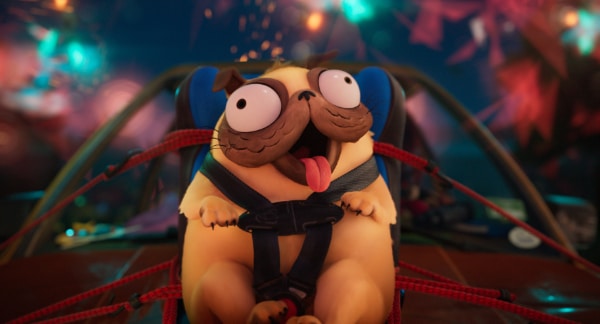
The view to technology in this film strikes a wonderful balance. It shows it for its positive benefits of creative communication, but also its negative effects of too much screen time in a humorous way. When the Dad tells everyone at the dinner table to put away their phones to have ten seconds of unobstructed family eye contact, I could not stop laughing. Anyone who has been with a teenager when a parent tells them to put away their phone, has seen the same bug-eyed response. Yet, the whole story centers on the untethered tech industry gone awry, even with clever comments from Linda when she says, “Who would’ve thought our phone tech company doesn’t have our best interest at heart?” Created as a comedy, it’s a modern-day version of Frankenstein with humanity overreaching ethical and creative boundaries that unleash catastrophic consequences. This film brilliantly makes a dystopian theme into an animated hero story.
Just as Katie is about to leave for the airport to move from their Michigan home to California for school, her dad decides they will instead take their last family road trip together to Los Angeles.
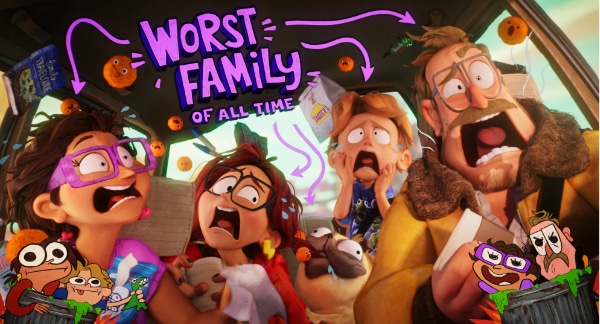
Along the way, her nature-loving dad wants them to hike on trails at every rest stop but instead Katie and Aaron are glued to their phones. Katie’s roommate calls to show all the wild antics happening at their dorm in her absence but loses connection to PAL, her personal assistant (voiced by Olivia Coleman) platform that everyone refers to as “our tech savior.” She can’t connect to wifi while on this part of their family road trip so reluctantly goes along with her dad’s adventures.
In the meantime, PAL’s creator, Mark (Eric Andre) reveals to the world the next generation of technology—the PAL Max or personal robot who does everything for you, assuring the world that, “they won’t ever turn evil.”
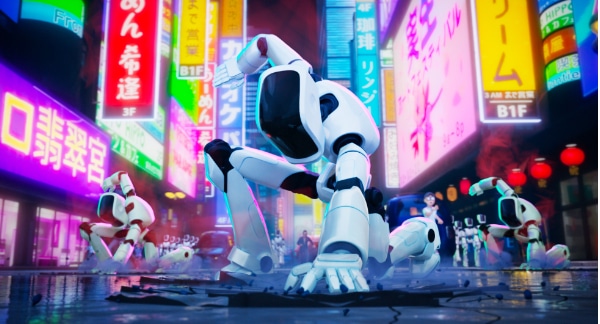
While the Mitchell family fuels up at a rest stop the robot apocalypse begins with the robots-turned-evil capturing human beings into pods that will be released into space. Seeing this all unfold as they take refuge in a convenience store, the Mitchells board themselves up inside using their standard tools as weapons. Facing the danger, they band together as the Dad delivers the best pep talk: “We’re here because we’re not like normal people. Mitchells have always been weird and that’s what makes us great!” They go on to fight the robots with all their weirdness becoming extraordinary citizens. Each family member’s oddities become useful in the process and they begin to see each other in a whole new light.
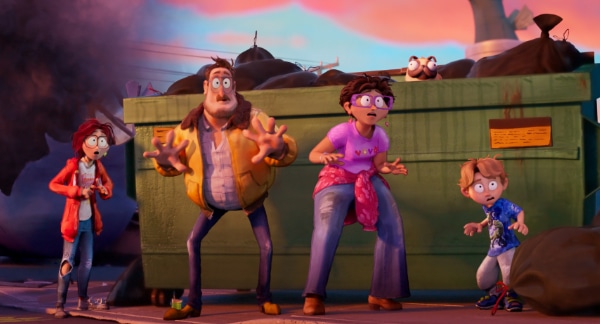
All throughout the story Katie feels at odds with her dad until her mother tells her, “Give him the benefit of the doubt. He’s always trying harder than you ever know.” She comes to realize that these truly are “her people.” Family relations are challenging, but in the end it’s all so worth it. Family is all we have. And we only have one, so it’s worth fighting for, even if we are a little weird. Every family has its uniqueness and kids need help to see that as a gift rather than a problem. It is in the ordinary that the extraordinary is found. If young people get this life lesson from the film, then it’s a great success.
This is a good film to watch for the next family movie night that provides an opportunity to share together afterwards what each member of the family takes away from the story. Not only is it a story about family, but it is also a film about media mindfulness and how technology has its positive and negative aspects that need our critical attentiveness. Machines can take us over if we let them or they can become tools for our human development. We have a choice. Thanks to a pug named Monchi, this life lesson became easy for parents to talk about with their kids.
Unfortunately and most disappointingly, at the end is slipped a very subtle LGBTQ message when the mother asks her college-aged daughter if her and another girl from school are “official.” She then asks if she will bring her home for Thanksgiving. Honestly, this slipped by me the first time I watched it and probably most kids won’t notice. But, for parents, this is something to be aware of that infiltrates even the most innocent children’s stories, indirectly like in this case, or blatantly in Babysitter’s Club also on Netflix.

